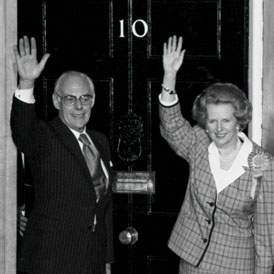David Cameron and ‘those inner cities’
Thatcher said “there is no such thing as society” – David Cameron wants to build a “stronger society”. Malcolm Boughen looks at how Tory thinking on inner cities has evolved over the last 30 years.

It was the early hours of the morning after the 1987 General Election victory. Margaret Thatcher was addressing the celebrating faithful in Conservative Central Office. But after the usual thanks and congratulations, there was one message that night that no-one had expected to hear. “We must do something about those inner-cities”, she declared.
It was a message that has echoed down the years – and must have rung in the ears of David Cameron as he flew back from Italy last week. But, as he has set out his policies over the last few days, it has become clear that his strategy is very different from hers – and, in some ways, may even be a consequence of what she did all those years ago.
Because what Mrs Thatcher wanted to do about “those inner-cities” was to win them over for her party. She had won three General Elections in succession. She had routed her opponents – but she had still not won over the inner-cities.
Indeed, the 1981 riots in parts of London, Birmingham, Leeds and Liverpool had threatened to derail her first government when it was still in its infancy. At the time, Michael Heseltine (not her favourite Minister) had been sent to Liverpool to look at the problems and seek solutions. He set out a programme of incentives to encourage businesses to move in, create jobs and regenerate the area. To an extent – in Liverpool – it worked.
But it was not the end of the problem. In 1985 trouble flared again in Brixton, in London, and Handsworth, in Birmingham – and this time, too, on the Broadwater Farm estate in Tottenham, where a policeman – PC Keith Blakelock – was murdered.
So, in the hours after her third election victory, the Prime Minister was still haunted by “those inner-cities”. This article from the time by Michael Jacobs has some interesting parallels with today.
But those riots were essentially political – they were protests against racism and deprivation – and Margaret Thatcher’s response was also political.
Later in 1987, in an interview with Woman’s Own, she came out with another famous observation: “There is no such thing as society”. She added: “There are individual men and women and there are families and no government can do anything except through people and people look to themselves first.”
And that instruction to individuals to “look to themselves first” was what she nurtured. She believed in charity, but her lesson from the Parable of the Good Samaritan was that he had the money to be able to help.
And the parents of last week’s rioters and looters are Thatcher’s Children. They were brought up in a climate – on both sides of the Atlantic – of “get what you can”. Here, it was Harry Enfield’s “Loadsamoney” character – in the US it was Gordon Gekko (in the film Wall Street) who famously declared that: “Greed is good”.
So now – while he promises a security crackdown and talks of bringing in an American police chief with a “zero tolerance” approach – he also promises to heal Britain’s “Broken Society”.
He asks: “Do we have the determination to confront the slow-motion moral collapse that has taken place in parts of our country this past few generations?”
Like his Labour counterpart, Ed Miliband, Mr Cameron draws a line between last week’s riots and the earlier moral failings of bankers, politicians and the media.
“Whatever the arguments, we all belong to the same society and we all have a stake in making it better,” he adds. “Government cannot legislate to change behaviour, but it is wrong to think that the state is a by-stander.
Mr Cameron tells us he went into politics to build a “stronger society”. It is hard to imagine his illustrious predecessor, Margaret Thatcher, at her heights ever making a similar declaration.